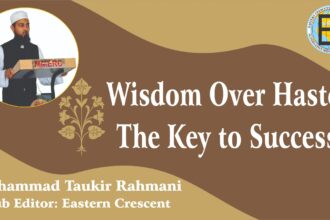The Soul of Knowledge Dwells in the Pages of Books
By: Mohammad Taukir Rahmani
Sub-editor: Eastern Crescent
Imagine a room steeped in pitch darkness. A person enters—bewildered, directionless, oblivious to the presence of walls or the whereabouts of the door. He gropes, stumbles, collides, and in his confusion, at times injures himself. Now envision a lamp lit within that very room—a single flame that not only dispels the darkness but reveals boundaries, offers direction, and ushers in clarity. The same person now walks with ease, guided and composed, spared from needless bruises and brought closer to his destination.
Such is the nature of knowledge—and the book is both the lamp that illuminates and the mirror that reveals. A lamp, for it shows the path ahead; a mirror, for it reflects the truth within. Just as darkness leads to missteps without light, the pursuit of knowledge becomes mere conjecture in the absence of books. Without books, thoughts lose their vision, knowledge remains crude, and civilization incomplete.
Though knowledge may seem to travel through oral traditions and lived experiences, it is an irrefutable truth that its purest essence rests in the silent eloquence of the written word. The history of human thought bears witness to this: wherever the bond with books was fortified, civilizations soared, intellects deepened, and consciousness expanded.
A book is not merely an assembly of paper and ink; it is a living, breathing entity—silent yet eloquent, motionless yet dynamic. It is a sage that teaches without pride, a philosopher that speaks without pause, a companion that never betrays. It leads its reader across centuries within moments—without fatigue, expense, or passage of time. It places him in the presence of bygone sages, unveils the beauty of their ideas, and grants access to their wisdom and counsel.
The noble minds of the past—whose faces we now can only envision through the canvas of imagination—reveal their presence through books. Indeed, books are mystical doorways, opening upon the past and allowing the reader to stand not as a spectator of history, but as a participant in a living dialogue with it.

To the seeker of truth, to the one in whom the flame of inquiry quietly burns, the realm of books is a sanctuary. His footsteps instinctively turn toward libraries; his journeys are often driven not by destination but by the pursuit of a rare volume, a forgotten treasure of thought. This love matures into a sacred bond—a relationship so profound that even in solitude, one feels fulfilled.
Books are the balm of sorrow and the sanctum of intellect. They bring coherence to scattered thoughts and instill in the human soul a graceful equilibrium. They are oceans of meaning that do not roar but draw the reader inward—each descent yielding new pearls of wisdom. Books connect us to the grandeur of past civilizations, help us untangle the complexities of our present, and prepare our minds for the architecture of the future. The nations that cherished books were destined to lead; those that severed this bond were relegated to the margins of time.
Reading is no less than a sacred discipline—a spiritual exercise that grants the mind breadth, the thought wings, and the heart refinement. In the lives of every reformer, every thinker, every discoverer, reading has always stood as a quiet devotion—an act through which the inner cosmos is illuminated and fresh dimensions of consciousness are born.
In an age where the world is entrapped by fleeting digital spectacles and the momentary charms of social media, it is the book that remains the enduring sanctuary of intellectual grace, cultural refinement, and spiritual depth. Books stand as a gentle rebellion against superficiality; they bring us back to our essence, teaching us to think, to feel, and to perceive with clarity.
To love books is to love awareness. It is to pledge allegiance to knowledge, to form a kinship with culture, and to forge a covenant with civilization. Books are not mere arrangements of inked words—they are incarnations of thought, illuminations of feeling, and mirrors of truth. Whoever befriends books ultimately befriends their own soul. Books teach us that silence can radiate light, and that solitude can host entire gatherings. They affirm that knowledge shall never perish—so long as even a single heart remains alive to receive it.















Hello! I’m at work surfing around your blog from my new iphone 3gs! Just wanted to say I love reading through your blog and look forward to all your posts! Carry on the outstanding work!
As I website possessor I conceive the articles here is real good, thanks for your efforts.
I do agree with all of the ideas you’ve presented in your post. They’re really convincing and will definitely work. Still, the posts are too short for starters. Could you please extend them a little from next time? Thanks for the post.